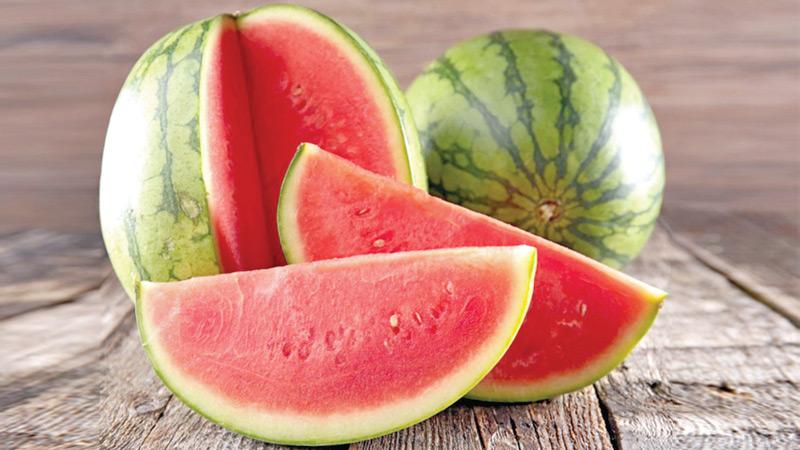
We are frequently advised to consume more fruits and vegetables to live a healthy life. Among the fruits that are popular in Sri Lanka, are watermelons. Due to its high-water content, watermelon is also great for quenching thirst. It can be purchased at a low price compared to other fruits, and the consumption of watermelons has both advantages and disadvantages.
Watermelons, scientifically known as Citrullis vulgaris, have a long history. South Africa is known as the homeland of watermelons. It has a history of about 5,000 years and is said to be one of the most popular foods in ancient Egypt. Later, watermelons spread to Europe and Asia. History testifies that they were also brought to the American continent when the people were transported from Africa to America for slavery.
This is considered as a ‘berry’ type of fruit because of the hard outer bark and the high percentage of water content. A watermelon vine grows about three metres long per year. About 92 percent of the weight of watermelon is water. However, the remaining eight percent contains many nutrients that are beneficial to the human body.
One bite of watermelon contains a considerable amount of vitamins: A, B6 and C as well as amino acids, lycopene and other antioxidants. It contains a moderate amount of potassium ions, making it another beneficial food for physical health. It contains little sodium ions and does not contain fat.
One of the special findings about watermelons is the very high amount of lycopene it contains. Two cups of watermelon juice are said to contain 15 to 20 milligrams of lycopene. It has been identified that it is the highest amount of lycopene contained in a red fruit. Lycopene enhances the overall health of the human body and gives colour to fruits like melons, tomatoes and red grapes.
Effect on blood sugar
Watermelon contains a significant amount of sugar, so it is a fruit that increases the blood sugar level in a short period of time. Although the glycemic index is 72 out of 100, the Glycemic Load index, which shows the amount of carbohydrates in the food, is 7.2 out of 100. Because the glycemic load index accurately indicates the risk, consuming watermelon in moderate amounts does not pose any risk of sugar-related diseases. However, if a person is suffering from diabetes, it is wise to consult a doctor or nutritionist before consuming watermelon regularly.
Consumption of watermelon has many benefits for the human body. As 92 percent of the weight of watermelon is water, it is an excellent food to prevent dehydration and increase the amount of fluids in the body. It is also a useful fruit for those who are struggling to reduce body weight. Lycopene, that watermelon contains, is a powerful component that reduces the risk of cancer and other components it contains prevent the formation of cancerous tumors. Watermelon also has several components that promote heart health.
Watermelon’s lycopene helps decrease the amount of cholesterol and blood pressure in the body. The amino acid citrulline it contains increases the amount of nitric oxide in the body. Nitric oxide helps dilate the blood vessels and thus lowers blood pressure.
Antioxidants
Vitamin A, B6, magnesium and potassium ions in watermelon are beneficial for the heart. The content of many antioxidants in watermelon reduces the damage to the muscles of the body due to various reasons. Lycopene in watermelon also prevents the eye muscles from becoming tired and inactive as we age. When there is some swelling and pain in the muscles of the body or when one is tired after playing too much, it is effective to give the watermelon extract to restore the person’s vigour soon.
Watermelon contains vitamins A and C. Vitamin C helps in the production of collagen in the body and collagen is an essential factor in healthy hair and skin. Vitamin A helps regenerate damaged skin cells and makes it look fresh and smooth. Beta-carotene and lycopene in watermelon reduce the damage caused by sunburn. A small amount of fibre and a high amount of water in watermelon help in the proper digestion process.
No matter how beneficial a fruit is, eating more than the right amount can cause some health problems. Eating too much watermelon during the night can cause indigestion the next day and due to its sugar content, body weight may increase. In addition, due to the significant amounts of potassium content in watermelons, consumption of watermelon in excessive amounts may not be beneficial for people with kidney related conditions.
